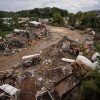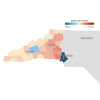A woman holds a sample ballot on the second day of early voting at a polling station, October 18, 2024, in Fairview, North Carolina. Despite concerns about early voting access after Hurricane Helene, many local officials reported record turnout for early voting, like in nearby Yancey County.
Allison Joyce/AFP via Getty Images
hide caption
toggle caption
Allison Joyce/AFP via Getty Images
BURNSVILLE, N.C. — Mary Beth Tipton has two stickers on the wall in her office that sum up what it’s like being an elections official. One’s a smiling, flaming cartoon dumpster that says in all caps: “IT’S FINE, I’M FINE, EVERYTHING’S FINE.”
“The other one is a circus tent and it says ‘Ringmaster of the’… we’ll just let people take a guess… ‘show’,” Tipton laughed.
She’s been the elections director in rural Yancey County, north of Asheville, for a dozen years, including during the pandemic, and thought she’d seen it all.
When Hurricane Helene came in and devastated western North Carolina with torrential flooding, everything changed. Yancey County, home to about 15,000 voters, is one of the communities hardest hit by the storm.

Yancey County elections director Mary Beth Tipton has two stickers in her office that describe what it’s like running elections, but the smiling cartoon dumpster that says “It’s fine, I’m fine, everything is fine” has taken extra meaning in recent weeks.
Stephen Fowler, NPR News
hide caption
toggle caption
Stephen Fowler, NPR News
In the final countdown to Election Day, the presidential race is top of mind for many Americans. But in Yancey County and across western North Carolina, election season seems like a foreign concept for people left picking up the pieces.
Tipton said it was hard coming back into the office the first time after the storm, but soon after she walked in, the phones started ringing off the hook.

Mary Beth Tipton could not fathom returning to the elections office after the hurricane swept through North Carolina, but has become energized by helping people cast their ballots in recent days.
Stephen Fowler | NPR
hide caption
toggle caption
Stephen Fowler | NPR
There were questions about how to send a ballot to far-flung areas people evacuated to. There were preparations to make and polling places to check on. One building washed into the river and others were used for aid distribution and sheltering.
On the first day of early voting last Thursday, voters showed up in record numbers and Tipton quickly remembered why she was there.
“This is one normal thing I can give my voters, the ones that have lost everything,” an emotional Tipton said during an early afternoon lull. “You wouldn’t believe the people that’s come through here today that’s said, ‘I don’t have a home,’ but they’re here to vote. This is one thing that we’re not taking away from them. We’re going to see to it that they do get to vote.”
There are 11 precincts in the county with various states of readiness for November’s Election Day, with assistance from the Federal Emergency Management Agency and some distribution cites clearing out.
“I have requested six tents from FEMA, and what they’ll do is they’ll come in with power generators, heat, Porta-Johns, it’s got a floor, it’s awesome,” she said. “I have to find a footprint of 60’ by 100,’ so that way we can set the tent up in these areas where we don’t have anything.”
As of Wednesday morning, just under 3,000 Yancey County voters cast their ballots in person, including more than 700 on that first day.
How to campaign after a hurricane? You don’t
While there are Herculean efforts to make the voting process business as usual, campaigning has taken a backseat for both parties and campaigns.
Driving through the main roads around Burnsville, the county seat, you see more logos for aid groups like Samaritan’s Purse than candidate signs. Many that weren’t washed away in the storm were removed by locals not wanting politics to be a focus.
Johnny Deyton is chair of the Yancey County Democrats, and said last week they would normally be calling folks to remind them about early voting and offer rides to the polls.
“The way it is now, we have no telephone service, no landlines in Yancey County are operating,” he said. “And the older residents of this county don’t believe in cell phones, so we’re having a tough time communicating.”
What little communication that has made it through has focused more on making sure people are safe, fed, and taken care of.
“We vote 70-75% of the population… the registered voters will be lucky to get within 60%,” he said. “Because people do have more concerns than voting, you know? They’re still without power, still have a tough time getting around.”

Johnny Deyton is a lifelong resident of Yancey County and chair of the local Democratic party. He knows almost all of his neighbors that died after Helene, and says turnout across the board will be lower this year.
Stephen Fowler | NPR
hide caption
toggle caption
Stephen Fowler | NPR
Deyton is a lifelong local with ties to the community that are stronger than the bridges and deeper than trees that were washed away by the storm.
He was one of several people who gathered at the party headquarters last week, to take a break from the new reality around them. And to grieve.
“You know, I know just about every person that lost their life,” he said. “There were good friends of mine. They are part Democrat and part Republican, but they were all good friends of mine.”
Politics has been put on the backburner, even for local candidates who could use all the support they can get.
Jim Parlier is a Democrat running for county commission who lives in an overwhelmingly Republican area of this overwhelmingly Republican county.
But his campaign and his viewpoints didn’t matter when it was time to clear debris and move past the worst of the flooding.
“It didn’t come up,” he said. “I have farmer neighbors who have bulldozers and they were clearing the road and I was pulling brush from their chainsaws. We didn’t worry about who was in which party.”
You could call the shift in Yancey County bipartisanship, but it’s more like an anti-partisanship that will likely linger far beyond November’s election.
“I really think that because it’s going to be a long recovery, a couple of years at least, that we’re going to stay together the way we have,” Parlier predicted.
He said he wanted to run for office to help people, and he’s been heartened to see how much the last several weeks has been neighbors helping neighbors going on with cleanup and distribution of aid.
He’s worried about what happens after the outside attention wanes.
“I think we need to continue to feel the love,” Parlier said. “I think we need to realize that from our helpers, both here and from the outside, that we’re getting great big hugs. That’s what all of us need… and certainly me.”
Campaigns pivot to GOTV to helping those in need
Hugs notwithstanding, there is still an election going on, and both presidential campaigns are in a delicate position: trying to balance relief efforts with encouraging people to vote in a state that both Vice President Harris and former President Donald Trump need to win.
At an early voting site in Rutherfordton last week, Republican National Committee Chair Michael Whatley, himself a western North Carolina native, said the party is using its resources to reach people with helpful information.
“This is about the families of North Carolina,” he said. “This is about the people of North Carolina first, that is obviously our highest priority and we’ll deal with elections as a distant second.”
The Harris campaign has also stepped into overdrive to deliver supplies to affected communities and ensure people know their voting options.
Even though well over a million people have already voted in North Carolina, and even though the North Carolina State Board of Elections passed rules to make voting easier and more flexible in western counties affected by the storm, Yancey County elections director Mary Beth Tipton is still worried about making sure her voters can cast their ballots.
“But actually seeing that the people are interested, seeing them show up and seeing them turn out: That’s what I do this for,” she said. “It’s them. That’s what you do, you provide it to your voters.”





